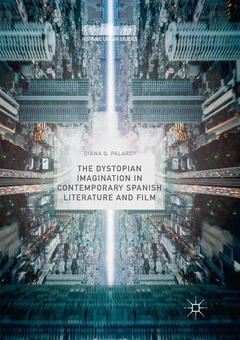Description
The Dystopian Imagination in Contemporary Spanish Literature and Film, Softcover reprint of the original 1st ed. 2018
Hispanic Urban Studies Series
Author: Palardy Diana Q.
Language: English
Subjects for The Dystopian Imagination in Contemporary Spanish...:
Publication date: 12-2018
Support: Print on demand
Publication date: 08-2018
Support: Print on demand
Description
/li>Contents
/li>Biography
/li>Comment
/li>
This study examines contemporary Spanish dystopian literature and films (in)directly related to the 2008 financial crisis from an urban cultural studies perspective. It explores culturally-charged landscapes that effectively convey the zeitgeist and reveal deep-rooted anxieties about issues such as globalization, consumerism, immigration, speculation, precarity, and political resistance (particularly by Indignados [Indignant Ones] from the 15-M Movement). The book loosely traces the trajectory of the crisis, with the first part looking at texts that underscore some of the behaviors that indirectly contributed to the crisis, and the remaining chapters focusing on works that directly examine the crisis and its aftermath. This close reading of texts and films by Ray Loriga, Elia Barceló, Ion de Sosa, José Ardillo, David Llorente, Eduardo Vaquerizo, and Ricardo Menéndez Salmón offers insights into the creative ways that these authors and directors use spatial constructions to capture the dystopian imagination.
1. Introduction.- 2. The Path to Voluntary Confinement: Dystopian Spaces of Consumerism in Ray Loriga’s Tokio ya no nos quiere.- 3. Grafting the Global North onto the Global South: Dystopian Transhumanism in Elia Barceló’s “Mil euros por tu vida”.- 4. The Architecture of Avarice in Ion de Sosa’s Sueñan los androides or: How I Learned to Stop Worrying about the Economic Crisis and Love the Sheep.- 5. Sensescapes of Precarity in El salario del gigante by José Ardillo, Madrid: frontera by David Llorente, and Nos mienten by Eduardo Vaquerizo.- 6. The Cartography of In/subordination in El sistema by Ricardo Menéndez Salmón.- 7. Conclusion.
Diana Q Palardy is Associate Professor of Spanish at Youngstown State University, USA. She has published articles in Bulletin of Hispanic Studies, ArizonaJournal of Hispanic Cultural Studies, Journal of Spanish Cultural Studies, Romance Notes, España Contemporánea, and Revista Chilena de Literatura. She is on the steering committee of the Society for Utopian Studies.




